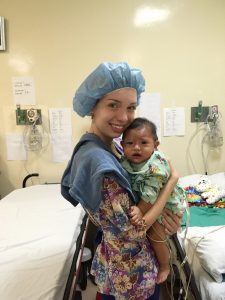During my three years as an interpreter for Surgicorps, I’ve heard a lot of things that formal Spanish classes and medical translation textbooks simply didn’t prepare me for: a toddler cursing at me in K’iche’ when I had to restrain him from ripping out his IV, two young girls staring at me incredulously when I responded that no, I was not married yet even though I was already 17, and an 80 year old man revealing to me that the secret to a long, healthy life was eating lots of frijoles.
But perhaps the declaration that stuck with me most came from a kindhearted man who had traveled 5 hours to find help for his son who was born with a cleft palate. When I asked if he had any questions about his son’s upcoming surgery, he shook his head and replied, “No. But I would just like to thank all of you for leaving your jobs and your families this week to come to Guatemala. There are so many here who need help, but so few who are willing to provide it.”
This sobering quote put a lot of things into perspective for me. First, I realized how much I take for granted living in a place with such abundant medical resources. When my wisdom teeth started to cause problems, I had my choice of 5 surgeons within a 10 mile radius of my home. When I broke my arm, I was casted that same night. And when I feel something as minimal as a sinus infection coming on, I have the privilege to drop into any of the 15 urgent care clinics in my town and receive an antibiotic. When you are used to such accessible medical solutions, it takes a quote like that to realize that most of the world does not share this same luxury.
And secondly, as I looked at this man holding his son and heard his words repeating in my head, I realized that there was nothing else I would rather do with my life than to be one of “the few” and help those whose circumstances hinder them from receiving the care they need and deserve. After that moment, I knew that I could never be content working in a place where I was an option: one out of 5 doctors in a 10 mile radius that could all treat the same problem, while knowing that somewhere else in the world, I would be someone’s only chance at finding help.
If it weren’t for my time with Surgicorps, I might never have chosen this path. But through these trips, I have been lucky enough to be surrounded by volunteers who have shown me what it means to be one of “the few”: selfless, kind, and hardworking medical and nonmedical personnel who invest their time to help those who need it, and who exemplify what can be achieved by using their talents for the good of others. Each year, we see more than 100 patients who travel for hours to receive care for lifealtering deformities and lifethreatening conditions, care that they could not access otherwise. For these people, volunteers like those at Surgicorps are their only hope for a better life.
Although the efforts of “the few” are not enough to heal the whole world, they are enough to make a lasting difference. With each trip to Guatemala, I am continually amazed by what a team of just 30 caring individuals can accomplish in just a week’s time, and by how many lives are changed in the process. My experience with Surgicorps has inspired to continue this type of work, not just for one week out of the year, but for the rest of my life. And with a career built on my Spanish skills along with my medical training, I can only imagine all of the quotes I have yet to hear, both comical and lifechanging.


